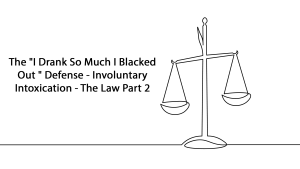The “I Drank So Much I Blacked Out ” Defense – Involuntary Intoxication – The Law Part 2
 By H. Michael Steinberg Colorado Criminal Defense Lawyer
By H. Michael Steinberg Colorado Criminal Defense Lawyer
Introduction – Involuntary Intoxication – The Law
In Part 1 of this series I addressed voluntary intoxication as a defense to Colorado criminal charges. This article now focuses on defending a criminal charge based on involuntary intoxication – for example – where the accused is secretly drugged or otherwise forced to consume substances involuntarily (without their consent) and in that state of mind commits criminal acts.
Intoxication is most often associated with self-induced or “voluntary” behavior. However, there are criminal cases where the person charged with a crime is drugged or becomes intoxicated without intending to do so. Involuntary intoxication is very different from voluntary intoxication so it follows that the law treats the two possible defenses very differently.
In my parent’s generation the phrase “she was slipped a Mickey” referred to drugging a person without their knowledge or consent. Slipping someone a “Mickey Finn” meant giving them a drink containing a drug that made them go to sleep. From the 1920s, this expression of unknown origin, is sometimes said to originate from the annals of the notorious Chicago barkeeper ( c .1896–1906) – Mickey Finn.
Involuntary intoxication can also involve ingesting substances not only by trickery and deceit but by force, intimidation, or other forms of coercion.
Colorado Law On An Intoxication Defense – Some Legal Definitions
Intoxication, voluntary or involuntary, is a “disturbance of mental or physical capacities resulting from the introduction of any substance into the body.“ § 18-1-804(4)
Voluntary, or self-induced intoxication, is “caused by substances which the defendant knows or ought to know have the tendency to cause intoxication and which he knowingly introduced or allowed to be introduced into his body. . . .” Id.
Involuntary intoxication is intoxication that is not self-induced, see § 18-1-804(3), and by definition occurs when the defendant does not knowingly ingest an intoxicating substance, or ingests a substance not known to be an intoxicant. See People v. Turner, 680 P.2d 1290 (Colo.App. 1983).
Must Be Proven – Fact Dependent
The characterization of intoxication “involuntary” is highly fact specific and depends on the evidence the defendant can produce and then admit into their case. The legal consequences of asserting that intoxication was voluntary or involuntary intoxication could not be more different.
Under Colorado law, an involuntarily intoxicated person is not criminally responsible for his conduct if at the time of the alleged offense the person accused of a crime “lacks capacity to conform his conduct to the requirements of law.” § 18-1-804(3).
Involuntary intoxication attaches no legal consequences because there is no immoral or blameworthy stigma attached to the condition.
Involuntary intoxication establishes that the accused’s “derangement is without culpability and hence is to be dealt with the same as if it were the result of mental disease or defect.”
W. LaFave A. Scott, Handbook on Criminal Law § 45.
We know that voluntary intoxication IS a defense but unlike involuntary intoxication, self-induced intoxication may only be offered by a defendant when it is relevant to negate the existence of a specific intent if such intent is an element of the crime charged.” § 18-1-804(1). Evidence of voluntary intoxication constitutes a defense ONLY specific intent crimes, but is incompetent as a defense to general intent crimes.
The Colorado Affirmative Criminal Defense Of Involuntary Intoxication 18-1-804
Here is a reprint of the entire Colorado statute addressing intoxication as a defense to a crimianl chatge:
Article 1. Section 18-1-804. Intoxication.
(1) Intoxication of the accused is not a defense to a criminal charge, except as provided in subsection (3) of this section, but in any prosecution for an offense, evidence of intoxication of the defendant may be offered by the defendant when it is relevant to negative the existence of a specific intent if such intent is an element of the crime charged.
(2) Intoxication does not, in itself, constitute mental disease or defect within the meaning of section 18-1-802.
(3) A person is not criminally responsible for his conduct if, by reason of intoxication that is not self-induced at the time he acts, he lacks capacity to conform his conduct to the requirements of the law.
(4) “Intoxication”, as used in this section means a disturbance of mental or physical capacities resulting from the introduction of any substance into the body.
(5) “Self-induced intoxication” means intoxication caused by substances which the defendant knows or ought to know have the tendency to cause intoxication and which he knowingly introduced or allowed to be introduced into his body, unless they were introduced pursuant to medical advice or under circumstances that would afford a defense to a charge of crime.
C.R.S. § 18-1-804
The Colorado Jury Instruction On Involuntary Intoxication
What follows is the Colorado Criminal jury instruction on involuntary intoxication.
H:35 INTOXICATION (INVOLUNTARY)
The evidence presented in this case has raised the affirmative defense of “involuntary intoxication,” as a defense to [insert name(s) of offense(s)].
The defendant’s conduct was legally authorized if:
1. he [she] lacked the capacity to conform his [her] conduct to the requirements of the law, because of intoxication, and
2. the intoxication was not self-induced.
The prosecution has the burden to prove, beyond a reasonable doubt, that the defendant’s conduct was not legally authorized by this defense. In order to meet this burden of proof, the prosecution must disprove, beyond a reasonable doubt, at least one of the above numbered conditions.
After considering all the evidence, if you decide the prosecution has failed to meet this burden of proof, then the prosecution has failed to prove the defendant’s conduct was not legally authorized by this defense, which is an essential element of [insert name(s) of offense(s)].
In that event, you must return a verdict of not guilty of [that] [those] offense[s].
Sidebars
Sidebar 1: Addiction To Intoxicants – No Defense
A defendant’s addiction to an intoxicant is insufficient to establish involuntariness. See Tacorante v. People, 624 P.2d 1324, 1327 (Colo. 1981); People v. Grenier, 200 P.3d 1062, 1075 (Colo. App. 2008).
Sidebar 2: Lack of Warning
However a defendant’s ignorance of the intoxicating effects of a voluntarily ingested substance may suffice to create an issue of fact.
In a case where the defendant was not warned of the intoxicating effects of a certain prescribed drug a jury instruction on the affirmative defense of involuntary intoxication was required. See People v. Turner, 680 P.2d 1290, 1293 (Colo. App. 1983). Therefore, the consumption of prescribed medications can form the basis of an involuntary intoxication defense.
Sidebar 3: Bad Or Missing Medical Advice
In the Colorado case of People v. Grenier, 200 P.3d 1062 (2008) The Colorado Supreme Court held that involuntary intoxication can occur when “a person takes a substance pursuant to medical advice, does not know that he or she is ingesting an intoxicant, or ingests a substance which is not known to be an intoxicating substance.”
Following this legal theory it should be noted that a defendant may become involuntarily intoxicated through the fault of another, by accident or even inadvertence.
Sidebar 4: Medication Misuse
When the intoxication is caused by an overdose or misuse of a prescribed medication, most courts are inclined to hold the defendant culpable.
The Major Challenge – Proof
The greatest challenge to a defendant who attempts to assert the defense of involuntary intoxication is one of proof. The defense requires the defendant to establish both intoxication and involuntariness. Whether or not a defendant’s criminal conduct should be excused by reason of involuntary intoxication is a question for the trier of fact – usually the jury.
Proving the actual ingestion of the claimed substance or medication almost always requires a forensic evaluation which evaluation cannot solely rely on the word of the defendant as to whether he or she ingested the medication before the criminal offense. The second stage is proving – again factually – the substance was not ingested voluntarily. This requires an in depth investigation into the facts of the case – and can require the services of a skilled investigator.
Summary And Conclusion – The “I Drank So Much I Blacked Out ” Defense – Involuntary Intoxication – The Law
Involuntary intoxication, in contrast to voluntary intoxication, is without moral culpability and, for this reason, is a complete defense to all crimes. Involuntary intoxication is intoxication which is “not self-induced,” and can occur when a person takes a substance pursuant to medical advice, does not know that he or she is ingesting an intoxicant, or is forced or tricked into ingesting a substance which is not known to be an intoxicating substance.
Affirmative defenses such as involuntary intoxication, admits the crime occurred but asserts that circumstances exist to void the criminal conduct in full.
An “affirmative defense” means that unless the state’s evidence raises the issue involving the alleged defense, the defendant, to raise the issue, must present some credible evidence on that issue. If the defense is an affirmative defense, then the guilt of the defendant must be established beyond a reasonable doubt as to that issue as well as all other elements of the offense.
Colorado Criminal Law – The “I Drank So Much I Blacked Out “ Defense – Involuntary Intoxication – The Law
The reader is alerted to the fact that Colorado criminal law, like criminal law in every state and at the Federal level, changes constantly. The article appearing above was accurate at the time it was drafted but it cannot account for changes occurring after it was uploaded.
 ABOUT THE AUTHOR: H. Michael Steinberg – Email The Author at: hmsteinberg@hotmail.com
ABOUT THE AUTHOR: H. Michael Steinberg – Email The Author at: hmsteinberg@hotmail.com
A Denver Colorado Criminal Defense Lawyer – or call his office at 303-627-7777 during business hours – or call his cell if you cannot wait and need his immediate assistance – please call 720-220-2277.
“A good criminal defense lawyer is someone who devotes themselves to their client’s case from beginning to end, always realizing that this case is the most important thing in that client’s life.”
Putting more than 40 years of Colorado criminal defense experience to work for you.
You should be careful to make a responsible choice in selecting a Colorado Criminal Defense Lawyer. We encourage you to “vet” our firm. Over the last 40 years – by focusing ONLY on Colorado criminal law – H. Michael has had the necessary time to commit to the task of constantly updating himself on nearly every area of criminal law, to include Colorado criminal law and procedure and trial and courtroom practice.
H. Michael works hard to get his clients the best possible results in and out of the courtroom. He has written, and continues to write, extensively on Colorado criminal law and hopes this article helps in some small way.
 Colorado Criminal Lawyer Blog
Colorado Criminal Lawyer Blog

